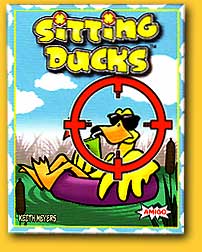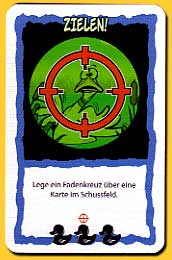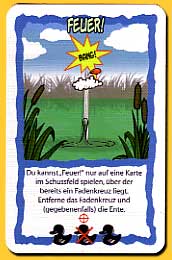Sitting Ducks
Author: Keith Meyers
Publisher: Amigo
Year: 2006
review by

| x |
|
|
|
|
|
|
|
|
|
|
|
|
|
|
|
|
|
|
|
|
|
|
|
|
|
|
|
|
|
|
|
|
|
|
|
|
|
 |
Sportsmanlike as we are, we set out to keep the duck population up to the mark. Just imagine, they cross the streets without warning, and that at an annoying slow pace, while we in our flashy car are always in a hurry for our appointment with some lady. At such moment we restrain ourselves from proper action, not only because of the numerous bystanders and possible witnesses, but we have a memory like an elephant, and that will come in very useful coming hunting weekend. Then we are more than happy to have a shot at that duck sipping from his cocktail!
Three to five players are hunting in 'Sitting Ducks', but also have to guard their own ducks in the pond from the other huntsmen. To survive with at least one duck, and shoot all of the other players to Duck Heaven is the motto in this light-hearted card game. The player who is the last to survive with any of his ducks has won the game. |
|
|
|
|
|
|
| x |
|
|
|
|
|
|
|
|
|
|
|
|
|
|
|
|
|
|
|
|
|
|
|
|
|
|
|
|
|
|
|
|
|
|
|
|
|
| First we set up the hunting area; six sky cards, place the pond card deck at the right of these sky cards and the action card deck at the left of them. Six pond cards are initially put below the sky cards, from left to right. Most of them are duck cards in one of the players colours, but there also are the occasional empty water cards among them. Each player gets three action cards, and has to play one of them each turn, and refill his hand to three again at the end of a turn. |
|
|
|
|
|
|
| x |
|
|
|
|
|
|
|
|
|
|
|
|
|
|
|
|
|
|
|
|
|
|
|
|
|
|
|
|
|
|
|
|
|
|
|
|
|
|
|
|
|
|
| x |
|
|
|
|
|
|
|
|
|
|
|
|
|
|
|
|
|
|
|
|
|
|
|
|
|
|
|
|
|
|
|
|
|
|
|
|
|
| The two most common cards from the action cards are the 'take aim' and the 'fire' cards; it is with these that the duck are hunted and fired at. With a 'take aim' card a player may place a targeting card above any of the ducks: with a 'fire' card any of the targets (ducks or empty water) are taken away - a duck card is out of the game. The empty position is taken by the card from the right, and so the whole row shifts to the right, eventually leaving an empty spot at the right that gets filled by a new card from the pond card deck. So far so good, but there are other cards that give the opportunity to change the position of a duck, friend of foe. There is an action card that shifts the whole row one position to the left, freeing the left duck from the pool; the card is placed under the pond card deck - the duck is save for the hunters for some time as it will not reappear until all cards above it have entered the pool first. |
|
 |
|
|
|
|
|
|
| x |
|
|
|
|
|
|
|
|
|
|
|
|
|
|
|
|
|
|
|
|
|
|
|
|
|
|
|
|
|
|
|
|
|
|
|
|
|
|
|
The position of a duck in the pool can be changed, so as to manoeuver the duck from another player in the line of the target card, or manipulate a duck to the left, away from the pond. There is the occasional card that gies a duck the possiblity to hide behind another duck; it can only be fired on again after the duck on top is hit and taken away. Other cards relate to the target cards that can be moved, or give the opportunity to fire at an adjacent duck instead of the duck right below the target. |
|
|
|
|
|
|
| x |
|
|
|
|
|
|
|
|
|
|
|
|
|
|
|
|
|
|
|
|
|
|
|
|
|
|
|
|
|
|
|
|
|
|
|
|
|
| x |
|
|
|
|
|
|
|
|
|
|
|
|
|
|
|
|
|
|
|
|
|
|
|
|
|
|
|
|
|
|
|
|
|
|
|
|
|
 |
|
|
|
|
|
|
|
|
|
|
|
|
|
|
|
|
|
|
|
|
|
|
|
|
|
|
|
|
|
|
|
|
|
Players with ducks in the pond at game start may have a disadvantage as they will experience heavy firing on their ducks, but players who might think they will get away unharmed are wrong! In this game there is indiscriminate fire at anything moving, or better: sitting! This is what makes it so cheerful; it is not the tactics this time, and (almost) no thinking. Play a card, perform the action, take a card - that's it. And it is mandatory to play a card, even if the action is harmful for any of the own ducks.
The illustrations have been made with the necessary humour; they have a nice cartoonesk atmosphere. On the cards are symbols that are excerpts of the text above it; they make it very easy to learn and play the game instantly.
'Sitting Ducks' is a fast and playful game to act as an in between or at the end of a players evening when it still is too early to part and go home. Feelings from other games may be taken into this game: 'Ah, a purple duck; we haven't seen such in a long time.' My righthand neigbour plays a 'take aim' card at it; you know what? 'Fiiiirrrre!'
© 2006 Richard van Vugt
Sitting Ducks, Keith Meyers, Amigo, 2006 - 3 to 6 players, 10 years and up, 20 minutes
|
|
 |
|
|
|
|
  |
|
|
|
|
|
|
|
|
|
|
|
|
|
|
|
|
|
|
|
|
|
|
|
|
|
|
|
|
|
|
|
|
|
  |
|
|
|
|
|
|
|
|
|
|
|
|
|
|
|
|
|
|
|
|
|
|
|
|
|
|
|
|
|
|
|
|
|
|
|
|
|
  |
|
|
|
|
|
|
|
|
|
|
|
|
|
|
|
|
|
|
|
|
|
|
|
|
|
|
|
|
|
|
|
|
|
  |
|
|
|
|
|
|
|
|
|
|
|
|
|
|
|
|
|
|
|
|
|
|
|
|
|
|
|
|
|
|
|
|
|
|
|
|
|
  |
|
|
|
|
|
|
|
|
|
|
|
|
|
|
|
|
|
|
|
|
|
|
|
|
|
|
|
|
|
|
|
|
|
|
|
|
|
| x |
|
|
|
|
|
|
|
|
|
|
|
|
|
|
|
|
|
|
|
|
|
|
|
|
|
|
|
|
|
|
|
|
|
|
|
|
|
| x |
|
|
|
|
|
|
|
|
|
|
|
|
|
|
|
|
|
|
|
|
|
|
|
|
|
|
|
|
|
|
|
|
|
|
|
|
|
 |
|
|
|
|
|
|
|
|
|
|
|
|
|
|
|
|
|
|
|
|
|
|
|
|
|
|
|
|
|
|
|
|
|
 |
|
|
|
|
|
|
|
|
|
|
|
|
|
|
|
|
|
|
|
|
|
|
|
|
|
|
|
|
|
|
|
|
|
| x |
|
|
|
|
|
|
|
|
|
|
|
|
|
|
|
|
|
|
|
|
|
|
|
|
|
|
|
|
|
|
|
|
|
|
|
|
|
 |
|
|
|
|
|
|
|
|
|
|
|
|
|
|
|
|
|
|
|
|
|
|
|
|
|
 |
|
|
|
|
|
|
|
|
|
|
|
|
|
|
|
|
|
|
|
|
|
|
|
|
|
|
|